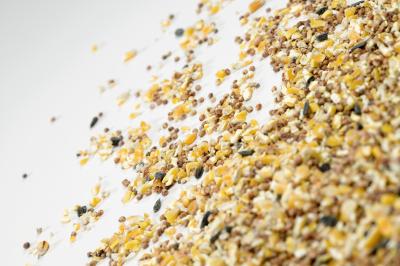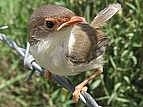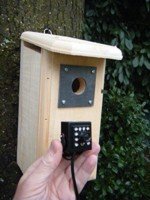
When a chicken takes food and water it is passed from the mouth into the crop which is located just outside the body cavity in the neck region. It is then stored there until it is time to pass it on to the rest of the digestive tract. When the crop is empty, or nearly empty, it sends hunger signals to the brain so that the chicken will eat more. Although salivary glands of the mouth secrete the digestive enzyme amylase, very little digestion actually takes place in the crop, it is simply a temporary storage pouch.
Inspecting the crop of a chicken regularly should spot cases of either impacted or sour crop early, conditions that if left unchecked can be serious and in the case of an impacted crop, may result in the death of the chicken. As part of your daily routine it is a good idea just to check that the chicken does not appear to look swollen in the morning. Recommended weekly routine to check for crop problems.
Inspect your chickens, looking in particular at the chest where the crop is located. Look out for any birds whose chests seem bigger than usual or are obviously swollen. Are any of the birds lethargic and showing a sudden weight loss? In addition they may make strange head movements, swaying them back and forth, due to the discomfort of the crop.
You should carefully pick up the bird, keeping it firmly tucked under one arm with its wings and feet secured. Inspection should be done in the morning, since their crops should be emptied then after having not fed during the night. It may also be easier to pick the bird up while it is still on its perch.
Gently rub the chicken along the chest with your hands, to locate the crop. This is located just below the neck and in the centre of the chest. Feel for any abnormalities, the crop should feel empty and loose without any hardness or sensation of liquid inside. Chickens with a 'squishy' crop, may have the beginnings of sour crop, a condition which will also be confirmed by a foul smell emanating from the beak.
If when you examine the chicken, the crop feels very full, as if it is full of dough, but no foul smell comes from the bird's mouth, it is likely that it has an impacted crop or is crop bound. This condition needs treating to prevent the bird from starving to death. In mild cases, the contents of the crop can be softened before emptying.
You should take a chicken with a suspected crop problems to a vet immediately, where treatment can be provided.
 Homemade Designs for Bird Traps
Homemade Designs for Bird Traps
Homema
Homemade Designs for Bird Traps
Homemade Designs for Bird Traps
Homema
 How to Make Squirrel Proof Bird Food Seed
How to Make Squirrel Proof Bird Food Seed
How to Make Squirrel Proof Bird Food Seed
How to Make Squirrel Proof Bird Food Seed
 Bird House Camera
I know many will disagree, b
Bird House Camera
I know many will disagree, b
 How to Care for Baby Birds That Have Fallen Out of a Nest
How to Care for Baby Birds That Have Fallen Ou
How to Care for Baby Birds That Have Fallen Out of a Nest
How to Care for Baby Birds That Have Fallen Ou
 How to Make a Bird House for Doves
How to Make a Bird House for Doves
How
How to Make a Bird House for Doves
How to Make a Bird House for Doves
How
Copyright © 2005-2016 Pet Information All Rights Reserved
Contact us: www162date@outlook.com